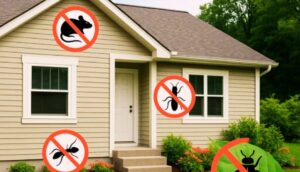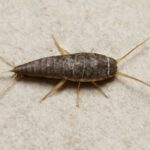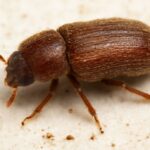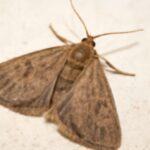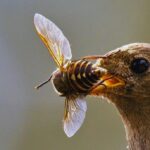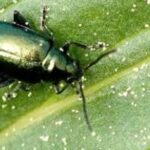Natural & Chemical Solutions

When the floodwaters finally go down, the mess they leave behind can be overwhelming. One of the most frustrating leftovers? Mosquitoes. All that standing water turns into the perfect nursery for these annoying little biters.
The good news? You don’t have to let them take over your yard or your peace of mind. Whether you prefer natural, family-safe remedies or want something a bit stronger, there are plenty of ways to fight back.
In this easy-to-follow guide, we’ll break down the best mosquito control options after flooding—both natural and chemical—so you can pick what works best for your space. Plus, we’ll tackle your top mosquito questions so you can keep your home comfortable and bite-free.
As an Amazon Associate, I earn from qualifying purchases
Why Do Mosquitoes Show Up After Flooding?
Let’s be honest—dealing with flood cleanup is already exhausting. But just when you think it’s over, here come the mosquitoes!
So, why do they swarm in right after a flood?
When heavy rain floods your yard or neighborhood, water often collects in low spots, drains, ditches, or even under your home. These waterlogged areas quickly become prime real estate for mosquitoes. Female mosquitoes love still water—they lay their eggs there.
And here’s the kicker: under warm, humid conditions (which often follow storms), mosquito eggs can hatch in just 1 to 2 days.
So yes, mosquito populations can explode almost overnight. That’s why it’s so important to act fast. The sooner you step in, the easier they are to control.
Natural Mosquito Control That Actually Works
If you’re not a fan of chemical sprays—or if you have kids, pets, or a garden to think about—natural mosquito control might be your best bet. The good news? There are plenty of eco-friendly ways to stop mosquitoes without harsh chemicals.
1. Eliminate Standing Water Right Away
This is your first and most crucial step. Mosquitoes don’t need much to breed. Even a tiny puddle in a flower pot can do the trick.
Pro pick: Raindrip Gutter Cleaning Scoop – makes unclogging gutters after floods quick and easy.
Here’s what to check:

-
Dump water from buckets, toys, and planters
-
Clean out birdbaths and pet bowls daily
-
Unclog gutters and storm drains
-
Fill in low spots in your yard where water pools
Every drop you remove means fewer places for mosquitoes to breed.
2. Use Mosquito Dunks with Bti
These small, floating tablets (shaped like donuts) contain a natural bacterium called Bti (Bacillus thuringiensis israelensis). Bti kills mosquito larvae—but it’s totally safe for pets, birds, fish, and plants.
Toss them into water that can’t be drained, like:

-
Ponds
-
Rain barrels
-
Ditches
-
Water features
It’s a simple, effective solution with zero chemical worries.
Summit Mosquito Dunks – a top-rated, long-lasting natural larvicide.
3. Spray with Essential Oils
Nature gives us some powerful mosquito repellents. Oils like:

-
Lemon eucalyptus
-
Citronella
-
Peppermint
-
Lavender
-
Tea tree
Mix a few drops with witch hazel and water, then spray it on your skin, around your patio, or near windows and doors.
It smells great to us—but mosquitoes hate it.
Top choice: Murphy’s Naturals Lemon Eucalyptus Oil Spray – DEET-free and family-friendly.
4. Grow Plants That Repel Mosquitoes
Looking for a low-maintenance mosquito barrier? Just plant these around your home:
-
Marigolds – contain pyrethrum, a natural bug fighter
-
Basil – gives off a scent mosquitoes avoid
-
Lemongrass – packed with citronella
-
Lavender – sweet-smelling and bug-repelling
They work best in pots or garden beds close to your doors, windows, and seating areas.
Garden helper: Back to the Roots Lavender Grow Kit – easy to grow indoors or outdoors.
5. Let Nature Do the Work
Some animals are natural mosquito predators, and they’ll gladly help you out—if you invite them in.
-
Dragonflies love munching on mosquito larvae
-
Bats can eat up to 1,000 mosquitoes an hour
-
Birds like swallows and purple martins snack on flying adults
Add bat boxes or birdhouses to your yard to welcome these natural helpers.
Chemical Mosquito Control for Bigger Problems
Sometimes, mosquitoes get out of hand—fast. If natural methods aren’t cutting it, don’t worry. There are plenty of chemical options that can help knock them down quickly and safely.
1. Try Chemical Larvicides
If your mosquito problem starts in water you can’t remove, larvicides can help.
Two strong options are:
-
Methoprene – prevents larvae from maturing
-
Temephos – often used in city-wide mosquito programs
These products are best for larger, stagnant water areas. Always read the label and follow directions carefully.
Best seller: Altosid Pro-G Mosquito Larvicide – long-lasting protection against larvae.
2. Use Outdoor Mosquito Foggers
Foggers release a fine mist of insecticide that kills adult mosquitoes on contact. Great for use around:
Many contain pyrethroids, which are fast-acting. For best results, fog at dawn or dusk—that’s when mosquitoes are most active.
Top rated: Cutter Backyard Bug Control Fogger.
3. Apply Insecticide Sprays
Need longer-lasting protection? Residual sprays stick to surfaces and kill mosquitoes when they land.
Look for products with:
-
Permethrin
-
Lambda-cyhalothrin
-
Deltamethrin
Spray around windows, doors, under decks, and in bushes. These sprays can last several weeks—even longer if it doesn’t rain.
Popular pick: Ortho Home Defense Backyard Mosquito & Bug Killer.
4. Set Up Mosquito Traps
Modern traps attract mosquitoes using CO₂, light, or heat. Once they fly in, they’re trapped or killed.
Top choices include:
-
Dynatrap
-
Flowtron
-
Mosquito Magnet
They’re great for patios and backyards, especially when used alongside other control methods.
Best sellers: DynaTrap Insect Trap, Flowtron BK-15D Electronic Insect Killer.
5. Call the Pros
Still swatting nonstop? It might be time to bring in a licensed pest control expert.
They’ll assess your yard, apply professional-grade treatments, and often provide ongoing protection plans for mosquito season.
What’s the Right Option for You?
Choosing the right solution depends on a few key things:
-
How many mosquitoes are around?
A few bites? Go natural. A backyard swarm? You’ll need stronger tools. -
Do you have kids or pets?
Stick with gentle, natural options in play areas or pet zones. -
What’s your budget?
DIY methods cost less. But sometimes it’s worth investing in expert help. -
Where’s the problem happening?
Small patio? Spray and trap. Flooded lawn? Try larvicides and foggers.
Often, the best plan is to combine natural and chemical methods. That way, you hit mosquitoes at every stage—from larvae to adult.
How to Keep Mosquitoes From Coming Back
Once you’ve cleared them out, don’t let mosquitoes make a comeback. Here are some easy prevention tips:
-
Keep gutters clean and flowing
-
Fix any leaky hoses or sprinklers
-
Use fine mesh to cover rain barrels
-
Sleep under mosquito netting if needed
-
Check and repair window and door screens
Consistency is key. Make mosquito prevention part of your weekly home routine, especially after heavy rain.
10 Frequently Asked Questions (FAQs)
1. How soon do mosquitoes appear after a flood?
Mosquitoes can begin breeding within 24–48 hours of standing water. Eggs hatch fast, so it’s crucial to act quickly.
2. Can mosquitoes spread disease after a flood?
Yes. They can transmit diseases like West Nile virus, dengue, Zika, and chikungunya, especially in warm, humid climates.
3. Are natural mosquito repellents as effective as chemicals?
They can be for mild infestations, but during a large outbreak, chemical options may provide faster results.
4. Are mosquito dunks safe for pets?
Yes. Bti-based mosquito dunks are non-toxic to pets, fish, birds, and humans when used as directed.
5. How long do chemical sprays last?
Most sprays last from 1 to 4 weeks, depending on the product and weather conditions. Reapplication may be necessary after rain.
6. Can I use foggers inside my home?
No. Most mosquito foggers are designed for outdoor use only. Indoor use can be dangerous without proper ventilation.
7. Do mosquito traps really work?
Yes. CO₂ and UV-light mosquito traps can reduce populations over time, but they work best when combined with other control methods.
8. What’s the best time of day to spray for mosquitoes?
Spray during early morning or evening when mosquitoes are most active. Avoid mid-day when the sun can degrade chemicals quickly.
9. Are mosquitoes more aggressive after flooding?
Yes. With new breeding sites and more competition, mosquitoes can become more active and aggressive.
10. When should I call a professional?
If your DIY efforts don’t reduce mosquitoes after a week or two, or if your area is experiencing a widespread infestation, it’s time to bring in experts.
Final Thoughts: Take Action Fast
Flooding brings enough stress already—don’t let mosquitoes make it worse.
The best mosquito control options after flooding combine quick action, smart prevention, and the right mix of natural and chemical solutions. Whether you’re battling them in your backyard or around your entire property, you now have the tools to take control.
Remember: the faster you act, the better your results. Don’t wait for those itchy bites to pile up.
Stop the swarm before it starts. Mosquitoes don’t stand a chance when you’re prepared.



